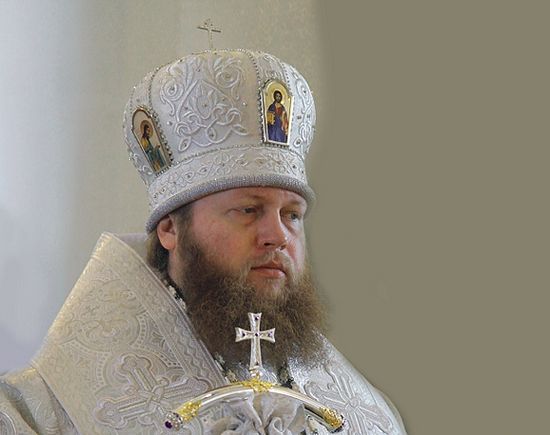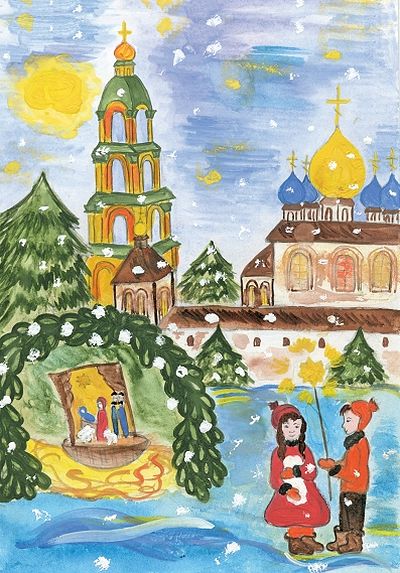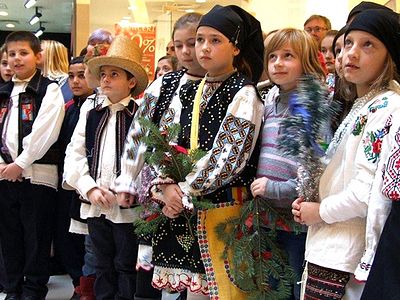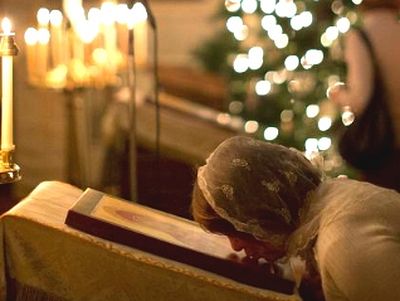“It is Christmas Eve. In the pale, smoky sky, greenish-white, appear the Christmas stars. You don’t know these Russian stars: they sing. You can hear with your heart only singing and praise. Blue velvet stretches across the sky, a crystalline starry light upon it. Where is the Bethlehem star?... Here it is…”
It was Ivan Shmelev who wrote such heartfelt words about Nativity, which he remembered from childhood and which can be only in Russia. The years pass, they fly rapidly, but ever year there is the same feeling—the nearness of Christmas, a return to childhood and the awaiting of a miracle. These festal days are fully of joy. These days bless no one to mourn, for it is impossible, because the Savior has come into the world, to save every one of us.
What is joy in life, and are we ready to leave all and follow after the star of Bethlehem more than 2,000 years after the Nativity of Christ? We spoke with Bishop Savva of Voskresensk, vicar of His Holiness Patriarch Kirill, superior of the Novospassky Monastery:
—Vladyka, we often speak of joy. In your understanding, what is joy? When does it happen?
—Actually, you feel joy when the Lord hears you and answers you. It’s the feeling that you are always walking in God’s line of sight. When you feel it, that’s joy. You are needed. God needs you for something. You’re not alone.
In every church on Nativity you hear “God is With Us,” and this is probably the greatest joy. He came into this world to be with us, with every one of us. And when you feel it, that Christ was born precisely for you, it’s a great joy, which draws you to look at your own life. And if God is in your heart then your life is filled with light and joy, despite any twists and turns, disorders, sicknesses, or suffering. And no matter how much time has passed on earth, His birth is the foundation of all human history. Even chronology is reckoned from the Birth of Christ.
You also experience joy at the services. People quite often associate the Church with sadness. There you are taught to suffer, to humble yourself, to endure, to cast your eyes to the floor; but the Church is above all the joy of being, the joy of eternal life. We have a religion of optimists, full of joy. We need only to understand this. There can be no joy in full solitude—but the Church is catholicity.
What is the Liturgy? It is a common service, common prayer in which we all share. Prayer can move mountains. Is this not joy? The Apostle Paul wrote in his epistle: Rejoice in the Lord always, and again I say rejoice (Phil. 4:4).
I love the feeling of a church, the flickering of the lampadas, the silence, and the singing of the choir. There’s a choir of grandmothers that remains in my memory, and their singing has crept into my heart throughout my whole life. Despite their difficult, trying lives, they have preserved joy and love for people, which we do not have now in full, because our world is immersed in problems and hassles. We have stopped being generous in caring for one another, in spiritual warmth, and in love. All our attention is directed towards ourselves, and we are enclosed in our own world. And in our own little “terrarium” it’s very difficult to think on the scale of eternity and love.
It's also a joy for me when people come to me. It’s such Divine love for you that He allows you to do good deeds for another, or a second, or a third person…
It’s also a joy now for me to be in silence, in peace, in serenity, in tranquility. These moments are rare, but when they come, I appreciate it. We must value every moment of life given us by God, and then we will be more joyful. We are not able to see joy in a sunny day, in getting together with people, in the possibility of going to church… There is much joy in life—we just have to be able to make it and feel it.
—This question will seem a little traditional to you, but even now, through so many passing centuries, people are seeking an answer for it: why was the Savior born in this simple cave? Was it really just to be crucified?
—The Savior brought mankind the commandment of love. He showed that everything is covered with love. And He taught us to love others. And the fact that He was crucified—this is the completion of the path, the path of love of the God-man. He was crucified out of love for us, out of love for His creation. He was born in a squalid cave because He came into the world not as a king, a conqueror, or authority; He came not to humiliate, but to exalt man…
—And how have you celebrated Nativity in the past?
—Nativity, of course, is winter and snow, and it is the road to the church. My grandmother took me. We went in boots. It’s always the feeling of some kind of mystery. Most important is that we arrived at church, and there it was already warm and joyous, and there was the feeling of a great event happening. It is always present in the Church. The Church always, year after year, returns us to experiencing light feelings, and gives us every year the possibility of reflection and return.
Christmas always returns me to childhood. The childlike perception of this great feast remains throughout your whole life. You’re feeling depressed, and suddenly—it’s the winter walk to church, and in your soul—the bells of Christmas from your childhood. And memories lead you away to those who are no longer with us in this earthly world, but who are always with you. They are alive in your heart, with God. It was they who led you to Christmas, on this path, which, by the way, does not promise anyone an easy life, but it is the path of love. It is a great labor of the human soul. In this labor, of working on yourself, there is also joy. This is what I would say, bearing in mind the previous question.
—In ancient times, the appearance or disappearance of stars was connected with the birth or death of great people, and it’s from this notion that we have preserved the expressions “a rising star” and “a fading star.” The Magi, following after the star to worship the newborn Jesus Christ, symbolize all peoples, seeking for the Fountain of Eternal Life. But in this symbol can be seen an appeal to us, living 2,000 years later—and what kind of people are we? Are we following the star of Bethlehem?
—The Lord does not promise us earthly joy, but promised us, then and now, the Kingdom of Heaven. But not just like that—we must move towards it, we must turn from certain things, from our attachment to our earthly habitation, from our passions, sins…
A definite section walks this path, but, of course, it is far from the majority. It is a small part, but the Lord said that the little flock would be saved. And the rest, the majority, will be busy with the commotion all around: one has to earn money, another has to go to the hospital, another to the market, another to the store, another needs to go on vacation. This bustle, which now exists, has conquered people. Moreover, now we have TV, the radio, the internet, and various entertainments.
Man should always restrict himself by the narrow gate, but man doesn’t want to. He wants to broaden himself to the extreme. But these narrow doors are a great obstacle. I remember what one oligarch said: “For me, humanity begins with a billion dollars.” The Lord disgraced him, because the crisis started and he lost his billions.
Thank God that there are great ascetics who walk in the light of the star of Bethlehem. They exist in every time and age. They exist today, we simply know little about them. But we have those grandmothers, who are with us, who were up at the crack of dawn, who, overcoming all difficulties and prohibitions, walked several miles to church in the dead of winter. Didn’t they follow the star of Bethlehem?
—Christmas was always considered the most important feast in childhood. What does it mean to be like children?
—To rejoice. To rejoice in all things. This joy should be natural, and childlike. It comes from the depths of the soul; it does not explain the event, but simply knows that it exists. It perceives all sincerely, guilelessly.
—And how to preserve this joy after a feast? Nativity is ending, and regular life is returning…
—This is the most difficult thing. Joy should not become a commonplace thing. Joy should not become something we’re used to. Joy is a condition of the soul, when we rejoice in something bright and great. Here, again, particular ascetic labors are not necessary—it is an ascetic labor to not judge. As soon as you learn never to judge anyone, you have joy.
Once someone told me of a very bitter situation in his life, that he constantly felt grief. I asked him how things were at home, at work, whether there were any problems. He admitted that he fell into some conflict situations. “Try not to judge anyone.” He was disappointed because he thought he had to do something grandiose, like traveling to a holy place, or taking expensive pills…
We always think on a grand scale, and we miss the simple things. I answered him: “You don’t need any of that—just try not to judge anyone.” “It’s so easy,” he replied. “Easy? You try it. I’m not asking you for anything, just try to live at least one week without judging anyone.” He returned in three days: “It’s impossible! I’m amazed—I can’t not judge someone. I specifically got up in the morning and drove away all thoughts, turned off my telephone. But within an hour or two I started thinking badly about someone. As soon as I drove this thought away, what a blissful state.” He went half a day without judging anyone, and it was well with his soul. But then he left his house, the phone began to ring… and he felt how he lost this joy.
Try to be at peace with everyone. You will say it’s impossible, that it cannot be implemented in the real world. But then, all the ascetics lived in the real world, and even then when they tried to leave it, the world came to them, to learn joy and love. Try not to judge, and the joy of the Nativity will last.






